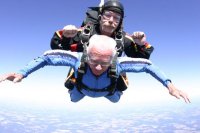Teaching Students to Honor The Elderly
In a culture that emphasizes youth, and where too many children do not spend enough time with grandparents, it is important in the coming year to include honoring the elderly as one of your teaching objectives. This need not be difficult, and it can fit into ongoing curriculum and instruction in a variety of ways.
The three essential components are to get students to think about the elderly, create interaction with the elderly, and then foster reflection about the experience.
Getting Them Started
Children in fourth grade and under benefit from seeing pictures of older adults involved in various activities as a starting point. As for the photos, ask students what they are doing, ask who they know who looks like this and does things like this, and ask them what is special about older people. In fifth grade and up, it can be effective to start with words such as "senior citizen," "grandparent," "older adult," and "elderly." Have students in groups generate lists of words in association with these words, and share them. Ideally, post them for all to see.
Next Steps
You can probably envision a number of next steps from just this start. The goal is to challenge stereotypes about older adults and to help students understand their importance. While it would be another form of stereotyping to encourage students to think that all seniors are wise, it will not hurt to introduce them to this possibility, and other positive ones. You might have students read books about senior citizens and/or grandparents. You might have them look up information about aging as part of a science or health class. Biographies of leaders, inventors, composers, writers, and others who were productive and prominent into their senior years can be used.
Creating an Interaction
Even young students can be helped to interview senior members of their families, and these can be designed with increasing complexity. Having older students work together to develop lists of questions that they share can be a powerful learning experience. Also, ask senior citizens to come into the classroom and preparatory assignments and questions can be appropriately generated. Many communities have retired seniors who can talk about their careers; many houses of worship have networks of seniors who can talk about history they have experienced. And many assisted living and senior housing facilities would be very pleased to engage some of their residents with schools and students, either at the school site or at their sites.
Depending on the subject area and one's learning goals, students can create a written product, a play, a video, an interview, a song, graphs and charts, a poster or other artistic portrayals. Ideally, these could be shared with other students, parents, community residents, etc. Be sure thank-you notes are written, where appropriate (not emailed!)
Reflection
Following the direct encounter (and ideally, more than one), have students reflect on what they have learned from their preparation, their encounter, and their presentation. Use the occasion to help build their affective vocabulary. As before, the format of the reflection can be whatever would fit into your curriculum.
An unnamed source in the writings of the Apocrypha said, "Dishonor not the old; we shall be numbered among them." It's good advice. To that, I would add the old adage, Respect your elders -- and learn from them.
Photo credit: rockman13 via flickr (CC BY-NC-SA 2.0).
